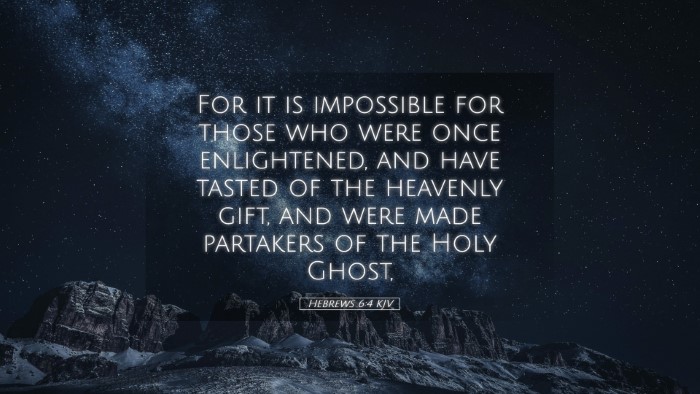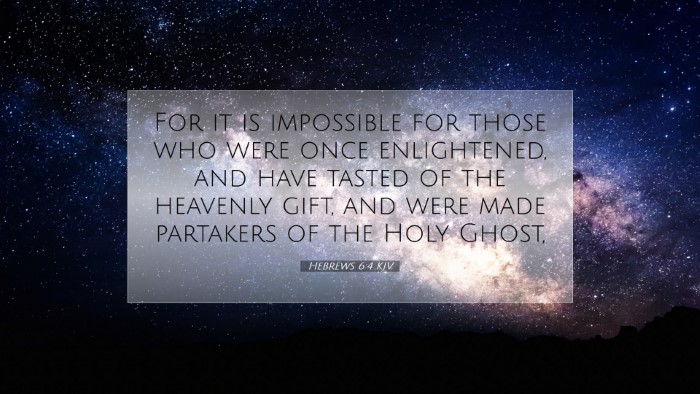Old Testament
Genesis Exodus Leviticus Numbers Deuteronomy Joshua Judges Ruth 1 Samuel 2 Samuel 1 Kings 2 Kings 1 Chronicles 2 Chronicles Ezra Nehemiah Esther Job Psalms Proverbs Ecclesiastes Song of Solomon Isaiah Jeremiah Lamentations Ezekiel Daniel Hosea Joel Amos Obadiah Jonah Micah Nahum Habakkuk Zephaniah Haggai Zechariah MalachiHebrews 6:4
Hebrews 6:4 KJV
For it is impossible for those who were once enlightened, and have tasted of the heavenly gift, and were made partakers of the Holy Ghost,
Hebrews 6:4 Bible Commentary
Hebrews 6:4 - In-Depth Commentary
"For it is impossible, in the case of those who have once been enlightened, who have tasted the heavenly gift, and have shared in the Holy Spirit."
Introduction
This verse from the book of Hebrews has generated much discussion and debate among theologians, scholars, and pastors. It speaks to the profound and serious nature of falling away from faith after having encountered the truths of God in a significant way. The insights from prominent public domain commentaries offer valuable perspectives for understanding this complex passage.
Matthew Henry's Commentary
Matthew Henry emphasizes the depth of the experience that the audience has gone through. He highlights several key phrases:
- Once Enlightened: This signifies a genuine comprehension of divine truths. Henry suggests that enlightenment brings a responsibility; those who have seen the light must not turn back into darkness.
- Tasted the Heavenly Gift: Here, Henry indicates that this tasting is more than mere acknowledgment; it implies a personal experience of salvation and the joys that accompany grace.
- Shared in the Holy Spirit: This phrase denotes a participatory reality in the life of the believer, showcasing that such individuals have been active participants in the work and fellowship of the Holy Spirit.
Henry poignantly warns that these experiences highlight the danger of apostasy. For those who have truly known God’s grace and then fall away, it raises the dreadful possibility that they cannot return to repentance, given the weight of their deliberate choice.
Albert Barnes' Notes on the Bible
Albert Barnes sheds light on the interpretative elements of Hebrews 6:4. His commentary focuses on the implications of apostasy:
- The Impossibility of Renewal: Barnes argues that this does not denote a loss of humanity or God’s sovereignty but highlights the seriousness of willingly rejecting truth once it has been fully received.
- Context of Warnings: He places this verse in the context of warning against spiritual complacency. The accustomed state of faith resulting in a casual relationship with the truth can lead to dangerous consequences.
- Warnings Past and Present: Barnes makes a strong comparison between the first recipients of the letter and contemporary believers, suggesting that the same dangers lurk for modern Christians who take their faith lightly.
His interpretation challenges readers to examine their spirituality seriously, grasping the gravity of the message being conveyed—turning away from faith after knowledge can lead to irrevocable consequences.
Adam Clarke's Commentary
Adam Clarke provides a theological lens on Hebrews 6:4 which invites reflection on divine grace and human responsibility:
- Understanding of Enlightenment: Clarke identifies enlightenment with an understanding that leads to conviction and transformation, arguing that it is not simply intellectual illumination.
- Tasting vs. Consuming: He elaborates on the significance of 'tasting' the heavenly gift, contrasting it with consuming. Tasting suggests a momentary engagement which does not necessitate full commitment.
- The Role of the Holy Spirit: Clarke notes that shared participation in the Holy Spirit implies a close relationship with God’s active presence. Therefore, to fall away after such experience reveals a stark rejection of God’s grace.
In Clarke’s view, the epistle serves both as an encouragement to hold fast to faith and a warning against the consequences of disregarding one’s spiritual responsibilities. A shallow experience of faith can lead to an easy dismissal of deeper spiritual truths.
Theological Implications
The implications of Hebrews 6:4 abound in both warning and reassurance. This passage encapsulates essential theological discussions about grace, free will, and God's faithfulness.
- Grace and Responsibility: The intersection of grace and human choice is no small matter. Those who are enlightened have a responsibility to continue in faith and action, echoing James 2:19 about belief without works.
- The Nature of Repentance: True repentance is more than acknowledgment; it demands a fundamentally oriented heart and life. The significance of genuine spiritual transformation cannot be overstated.
- Warnings Against Apostasy: Throughout the book of Hebrews, warnings against abandoning faith serve to remind believers of the seriousness of their commitment to Christ.
Conclusion
Hebrews 6:4 serves as a sober reminder for believers. The experiences articulated in this verse reveal the profound nature of knowing God and the equally profound dangers of turning away. As we reflect on insights from Matthew Henry, Albert Barnes, and Adam Clarke, we are urged to engage with our faith authentically and deeply. Pastors, students, and scholars alike are called to understand that the journey of faith is not merely about beginnings but also about perseverance in light of divine grace.


